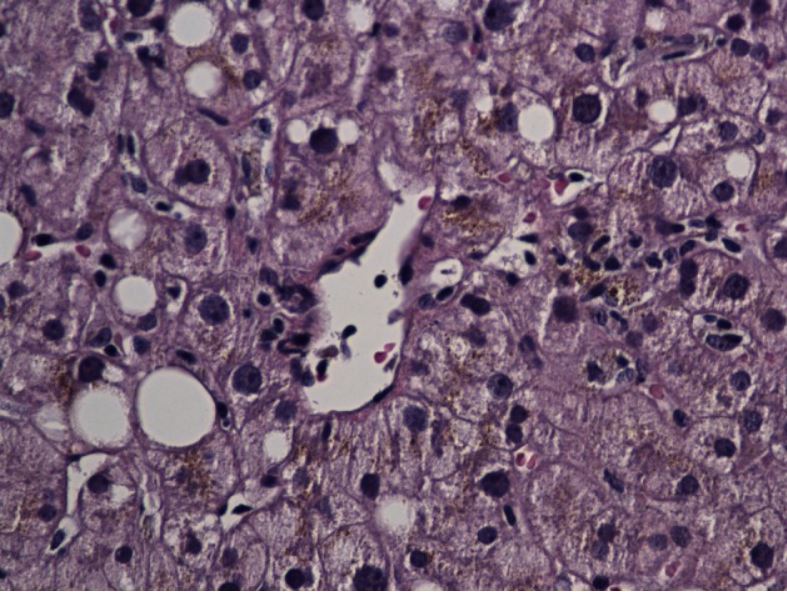Playlist
Show Playlist
Hide Playlist
Acute Liver Disease
-
Slides GIP Acute Liver Disease.pdf
-
Reference List Pathology.pdf
-
Download Lecture Overview
00:01 Welcome! With this talk, we're going to go into acute liver disease. 00:05 This is a relatively broad spectrum of diseases that can affect liver function. 00:12 And we're only going to give you here a general framework for thinking about the causes and manifestations. 00:20 So acute liver disease as suggested is acute severe liver injury that will reduce synthetic function. 00:27 So all the normal synthetic things that the liver does, it making coagulation factors and albumin, metabolizing bile, but also metabolizing small molecules that can impact CNS, central nervous system function. 00:41 So patients with acute liver disease will also frequently have encephalopathy. 00:46 The pathophysiology, this is rather broad. 00:50 A number of things can cause acute liver injury, acute liver failure. 00:55 Amongst the medications, acetaminophen, so that's the generic term or you may know it as Tylenol, that is actually the most common just because it is the most, one of the more widely used medications. 01:09 And you have to take quite a bit of acetaminophen but if you do, you can definitely impact acutely liver function. 01:18 Certain antimicrobials, usually uniquely in particular patients anticonvulsants and chemo therapies can also cause acute liver injury. 01:28 In the same fashion, exogenous toxins and alcohol is a toxin but also mushroom poisoning can do this. 01:35 A variety of infections, mostly viral, but other infections as well. 01:39 And then miscellaneous things such as Budd-Chiari syndrome, which is a venous occlusion syndrome, preeclampsia during pregnancy and autoimmune hepatitis or all other causes. 01:52 The clinical presentation. 01:54 You need to know what the liver does. 01:56 So liver metabolizes bilirubin heme, the liver is going to be responsible for metabolizing various small molecules that can impact central nervous system function. 02:09 The liver is going to make coagulation factors that the liver is going to make albumin so anything that the liver does is going to be impacted by acute liver injury. 02:21 So in our patients, we might expect to see jaundice with accumulation of indirect bilirubin, they will be sick, they may not want to eat, again, these are things that affect the central nervous system. 02:33 There may be abdominal pain, so with acute liver injury, we frequently have swelling of the liver. 02:39 And as a liver expands, there is a capsule around it called glistens capsule that is invested with nerve fibers so it can be sensed as pain, you may have right upper quadrant pain, and then clearly altered levels of consciousness. 02:54 Making the diagnosis is going to be a clinical diagnosis. 03:00 But more it's going to be looking at the liver chemistries to understand what is wrong with the liver function. 03:07 And coagulation panel is going to be important for looking at the, how much the coagulation factor synthesis has been impacted. 03:16 We'll want to look at bilirubins, we'll want to look at evidence of acute liver injury. 03:21 So an AST or ALTs, elevation, alkaline phosphatase, things like that. 03:25 A complete blood count may be helpful. 03:27 If there is an elevated, markedly elevated white count with a left shift and increased numbers of neutrophils that may suggest an infectious etiology. 03:35 On the other hand, a lymphocytosis may suggest a viral cause and then biopsy. 03:42 And we will want to do that to really establish, one, our diagnosis, and two, to help direct therapies. 03:49 And again, pathology comes in handy. 03:52 How are we going to manage this? Well, in fact, it really depends on the underlying cause. 03:56 And whether it's medication related and it's a one time hit, we just have to support the patient during the acute injury and the liver will regenerate. 04:05 Or if there's something more chronic or insidious, such as an infection or the Chiari syndrome or something like that. 04:13 Specifically for things like acetaminophen toxicity, what we will administer is N-acetylcysteine. 04:20 This is going to be a free radical and sulfhydryl scavenger. 04:24 And that's going to allow us to treat the metabolites from acetaminophen that are causing the toxicity to the hepatocytes. 04:32 And in extreme cases, mushroom poisoning for example, liver transplant is our only therapy. 04:41 In fact, in California, interesting little factoid, the number one indication for liver transplant is mushroom toxicity where people have gone out, thought that they were experts in picking the right mushroom and pick the wrong mushroom and have it ended up with terminal fulminant liver failure requiring transplant. 05:01 And with that, we come to the end of acute liver injury.
About the Lecture
The lecture Acute Liver Disease by Richard Mitchell, MD, PhD is from the course Disorders of the Hepatobiliary System.
Included Quiz Questions
What defines acute liver disease?
- Severe acute liver injury with reduced synthetic function and encephalopathy
- Mild acute liver injury with reduced synthetic function
- Moderate acute liver injury with reduced synthetic function
- Moderate acute liver injury with reduced synthetic function and ascites
- Severe acute liver injury with reduced synthetic function and ascites
What are the causes of acute liver disease? Select all that apply.
- Budd-Chiari syndrome
- Antimicrobials
- Anticonvulsants
- Small bowel obstruction
- Opioid-induced constipation
What is the most common medication-induced cause of acute liver disease?
- Acetaminophen
- Chemotherapy
- Budd-Chiari syndrome
- Alcohol
- Preeclampsia
Customer reviews
5,0 of 5 stars
| 5 Stars |
|
5 |
| 4 Stars |
|
0 |
| 3 Stars |
|
0 |
| 2 Stars |
|
0 |
| 1 Star |
|
0 |




